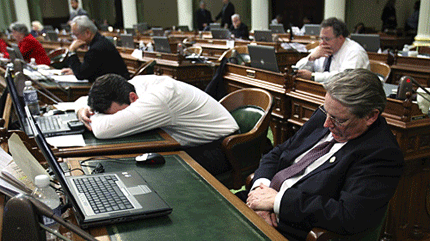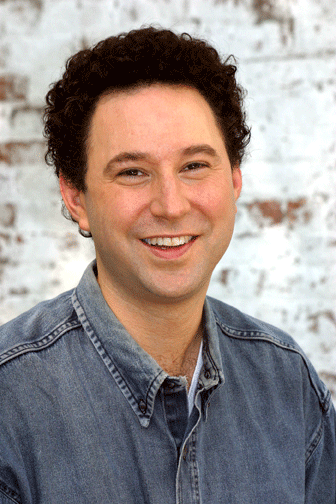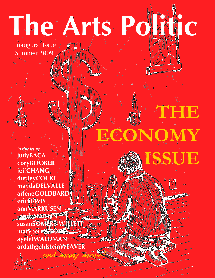
Wednesday, July 22nd, 2009
Free Band Names! :: The California Budget Disaster Edition

How funky is your budget compromise? How loose is your accounting?
Instead of killing myself over how f-ed up this Cali budget “compromise” is going to be for me and most everyone I care about, I figured I’d devote my energy to coming up with something everyone really needs: a list of band names inspired by this disaster.
Because who knows better than The Big 5 that this is as good a time as any to start a band or a crew?
So here we go. Free. Just shout us out when you blow up on Myspace. And please add more. The budget you save may be your own.
The Worthless Bonds
The Mandatory Furloughs
The I-O-Meez
The No Solution
The Terminated
Proposition Xed
Eff The Children
Cancel My Future
Long Summer Shortfall
I Moved To California And All I Got Was This Lousy Prison
Corrections Killed The Biology Star
And You Shall Know Us By The Trail Of The Idiots…
Cut Me Asshole
Fire Me Asshole
Pay Me Asshole
The Simple Majority
Masterrace Supermajority
Two-Thirds Of Death
The Oily Severants
Santa Barbara Oil Slick
Roll Over Pat Brown
The Michael Jackson Stimulus
The Gray Davis Revival
posted by Jeff Chang @ 8:59 am | 3 Comments
Thursday, July 9th, 2009
On Hip-Hop, the New Depression, and the Creativity Stimulus
Here’s an interview I just did that focuses largely on the role of the arts and culture in the current economic crisis. Huge thanks to Jasmine Mahmoud, editor of the fantastic new magazine and webzine The Arts Politic.
The inaugural issue features work from and interviews with other people who were at the White House briefing in May, such as Judy Baca, Dudley Cocke, and the great Arlene Goldbard. Bonus: Mayda Del Valle!
Check out and if you dig, support them.
Here’s an excerpt from the interview w/your boy:
The inclusion of you and Davey D, among other arts activists, seems to be a big step forward from the 1990s when political wars waged on hip-hop, and culture wars waged on the arts. Would you call this progress?…
Yes, I do think this is progress. At certain points in history, change seems to accelerate and I think we’re in the flux of that kind of moment right now. We witnessed an outpouring of art, culture, and creativity around last year’s elections. People like Tom Brokaw compared it to the Velvet Revolution. In other words, politics and creativity seemed to converge to bring about a societal leap. Into what, I’m still not sure. But we all have a hand in guiding where we will land.
I work among artists and community organizers daily, and the thing we’ve all noticed is that we have a great urge to convene, to share, to talk, to try to puzzle out the moment. Liz Lerman likes to joke that “artists aren’t afraid of living in Depression-like conditions because that’s our lived reality.” Right now, there’s a sense among everyone that there isn’t much to lose, and that’s liberating. What I think many of us are coming around to understand is that creativity is at the heart of community sustainability and renewal. Hip-hop is the perfect example—here’s the picture of forgotten, abandoned kids hard at work defining how to play amidst chaos. Out of nothing, they literally forge the conditions for their own breakthroughs. They created a new language for a new global generation.
In this country, the debates over the arts are still haunted by questions of individual freedom raised in the culture wars. These are rooted in President Kennedy’s founding Cold War-era charge for the NEA (articulated best here) in which artists were positioned as the social outsiders an enlightened U.S. democracy was happy to bring into the fold. Communists in Russia and China, by comparison, were oppressing dissident artists. (This logic ran its course by the end of the 1980s, when anti-arts neocons took up—quite seriously—the role of Kennedy’s cartoon communists. The irony escaped them, apparently.)
But what if we looked at arts and creativity as society’s key to collective survival? In this re-imagining, artists and creatives—like community organizers—are not outsiders, so much as those who experiment and test and prod, but within the heart of the community. Their risk is indispensable not because it comes from the fringe, but from the center. When they succeed, they strengthen community and move it forward…
Catch the entire interview here.
posted by Jeff Chang @ 2:37 pm | 0 Comments
Wednesday, July 1st, 2009
The Death of Vibe And The Future Of Magazines :: A Roundtable with Alan Light and Raymond Roker

Vibe’s death yesterday sparked conversations across the blogosphere about the future of magazines, especially the kind many of us most care about–urban culture and music magazines. I wanted to surface one of them here.
It began with a Twitter post that reposted to my Facebook account. Here was that original post (re-rendered into something resembling proper english).
Jeff Chang: I could live with a smaller media landscape–but we need that middle between 1m+ circulation mags and circs of less-than-100,000 zines back.
And who should reply but Alan Light.
Alan was one of my first editors at Vibe. (He actually did me the favor of sinking a horrible Tribe Called Quest piece I did, easily the worst interview I ever did…a long story for another time.) Alan started at Rolling Stone and went on staff there from 1989 to 1993. He moved over to become Music Editor at Vibe in its inaugural year and took over as Editor-in-Chief the following year, where he worked until 1997. He edited Spin from 1999-2002, then broke out to start a new magazine called Tracks.
Tracks is a really interesting story. It launched with independent capital in November 2003 with a circulation of about 150,000. It targeted readers from 30-50, a bit of an older audience, more white than not. This group was thought to be the holy grail of the dying music industry–they were folks who actually still bought music. The writing got better, they started moving more urban (Prince was on the cover at the time of “Musicology”) and they built an audience, doubling their circulation.
But by April 2005, they folded. The magazine industry had shifted dramatically. The middle–as in all media and entertainment industries, hell, in American society–could not hold.
Let’s pick this up where Alan responded:
Alan Light at 1:00pm June 30
you have no idea how right you are…well, ok, you have some idea. but take it from one who’s been there – it has become almost impossible to make that model work. which is awful, because it’s obviously the most interesting place to be. (more…)
posted by Jeff Chang @ 11:53 am | 37 Comments
Previous Posts
- Who We Be + N+1=Summer Reading For You
- “I Gotta Be Able To Counterattack” : Los Angeles Rap and The Riots
- Me in LARB + Who We Be Update
- In Defense Of Libraries
- The Latest On DJ Kool Herc
- Support DJ Kool Herc
- A History Of Hate: Political Violence In Arizona
- Culture Before Politics :: Why Progressives Need Cultural Strategy
- It’s Bigger Than Politics :: My Thoughts On The 2010 Elections
- New In The Reader: WHO WE BE PREVIEW + Uncle Jamm’s Army
Feed Me!
Revolutions
- DJ Nu-Mark :: Take Me With You
DJ Nu-Mark remixes the diaspora…party ensues! - El General + Various Artists :: Mish B3eed : Khalas Mixtape V. 1
The crew at Enough Gaddafi bring the most important mixtape of 2011–the street songs that launched the Tunisian & Egyptian Revolutions… - J. Period + Black Thought + John Legend :: Wake Up! Radio mixtape
Remixing the classic LP w/towering contributions from Rakim, Q-Tip + Mayda Del Valle - Lyrics Born :: As U Were
Bright production + winning rhymes in LB’s most accessible set ever - Model Minority :: The Model Minority Report
The SoCal Asian American rap scene that produced FM keeps surprising… - Mogwai :: Hardcore Won't Die But You Will
Dare we call it majestic? - Taura Love Presents :: Picki People Volume One
From LA via Paris with T-Love, the global post-Dilla generation goes for theirs…
Word
- Cormac McCarthy :: Blood Meridian
Read this now before Hollywood f*#ks it up. - Dave Tompkins :: How To Wreck A Nice Beach
Book of the decade, nuff said. - Joe Flood :: The Fires
The definitive account of why the Bronx burned - Mark Fischer :: Capitalist Realism
K-Punk’s philosophical manifesto reads like his blog, snappy and compelling. Just replace pop music with post-post-Marxism. Pair with Josh Clover’s 1989 for the full hundred. - Nell Irvin Painter :: The History of White People
Well worth a Glenn Beck rant…and everyone’s scholarly attention - Robin D.G. Kelley :: Thelonious Monk : The Life And Times Of An American Original
Monk as he was meant to be written - Tim Wise :: Colorblind
Wise’s call for a color-conscious agenda in an era of “post-racial” politics is timely - Victor Lavalle :: Big Machine
Victor Lavalle does it again!
Fiyahlinks
- ++ Total Chaos
The acclaimed anthology on the hip-hop arts movement - ARC
- Asian Law Caucus | Arc of 72
- AWOL Inc Savannah
- B+ | Coleman
- Boggs Center
- Center For Media Justice
- Center For Third World Organzing
- Chinese For Affirmative Action
- Color of Change
- ColorLines
- Dan Charnas
- Danyel Smith
- Dave Zirin
- Davey D
- Disgrasian
- DJ Shadow
- Elizabeth Mendez Berry
- Ferentz Lafargue
- Giant Robot
- Hip-Hop Theater Festival
- Hua Hsu
- Humanity Critic
- Hyphen Magazine
- Jalylah Burrell
- Jay Smooth
- Joe Schloss
- Julianne Shepherd
- League of Young Voters
- Lyrics Born
- Mark Anthony Neal
- Nate Chinen
- Nelson George
- Okay Player
- Oliver Wang + Junichi Semitsu :: Poplicks
- Pop + Politics
- Presente
- Quannum
- Raquel Cepeda
- Raquel Rivera
- Rob Kenner
- Sasha Frere-Jones
- The Assimilated Negro
- Theme Magazine
- Toure
- Upper Playground
- Wayne Marshall
- Wiretap Magazine
- Wooster Collective
- Youth Speaks
@zentronix
- No public Twitter messages.
Come follow me now...
Archives
- July 2014
- May 2012
- January 2012
- June 2011
- February 2011
- January 2011
- December 2010
- November 2010
- October 2010
- September 2010
- August 2010
- June 2010
- May 2010
- April 2010
- March 2010
- February 2010
- December 2009
- November 2009
- October 2009
- September 2009
- August 2009
- July 2009
- June 2009
- May 2009
- February 2009
- January 2009
- December 2008
- November 2008
- October 2008
- September 2008
- August 2008
- July 2008
- June 2008
- May 2008
- April 2008
- March 2008
- February 2008
- January 2008
- December 2007
- November 2007
- October 2007
- September 2007
- August 2007
- July 2007
- June 2007
- May 2007
- April 2007
- March 2007
- February 2007
- January 2007
- December 2006
- November 2006
- October 2006
- September 2006
- August 2006
- July 2006
- June 2006
- May 2006
- April 2006
- March 2006
- February 2006
- January 2006
- December 2005
- November 2005
- October 2005
- September 2005
- August 2005
- July 2005
- June 2005
- May 2005
- April 2005
- March 2005
- February 2005
- January 2005
- December 2004
- November 2004
- October 2004
- September 2004
- August 2004
- July 2004
- June 2004
- May 2004
- April 2004
- March 2004
- February 2004
- January 2004
- December 2003
- November 2003
- October 2003
- September 2003
- August 2003
- July 2003
- June 2003
- May 2003
- April 2003
- March 2003
- February 2003
- January 2003
- December 2002
- November 2002
- October 2002
- September 2002
- August 2002
- July 2002
- June 2002
We work with the Creative Commons license and exercise a "Some Rights Reserved" policy. Feel free to link, distribute, and share written material from cantstopwontstop.com for non-commercial uses.
Requests for commercial uses of any content here are welcome: come correct.


